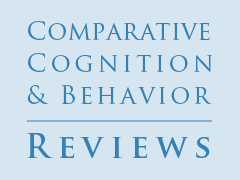The Comparative Psychology of Serially Organized Behavior
by Herbert Terrace,
Columbia University & the New York State Psychiatric Institute
Reading Options:
Download/Read PDF | Add to Endnote
Abstract
The study of serially organized behavior has benefited from a new paradigm for training sequences, from new technology for presenting multiple images in varied spatial positions and from new concepts for describing serially organized behavior. The new paradigm is the simultaneous chaining paradigm, one that presents all list items simultaneously, in a new configuration on each trial. Because there are no external cues to guide the execution of the required sequence, subjects must form a representation of the sequence and update it while moving from item to item. Experiments in which humans and monkeys were trained to learn sequences composed of arbitrary items showed that subjects acquired knowledge of the ordinal position of each item, and its relationship with other items from a list, without any requirement to do so. Symbolic distance and magnitude functions, that were obtained from both monkeys and humans, who were trained to execute arbitrary and numerical lists, provide strong evidence of an underlying ordinal knowledge, at both the behavioral and the neural level.
Terrace, H. (2010). The Comparative Psychology of Serially Organized Behavior. Comparative Cognition & Behavior Reviews, 5, 23-58. Retrieved from https://comparative-cognition-and-behavior-reviews.org/ doi:10.3819/ccbr.2010.50002
